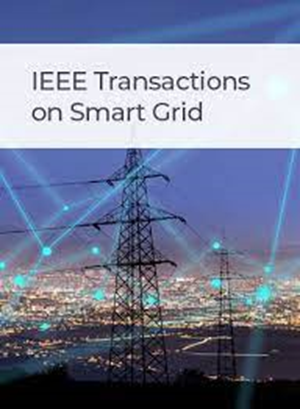Peer-to-Peer Multi-Energy Trading Among Heterogeneous Building Prosumers via Asynchronous Distributed Algorithm
IF 8.6
1区 工程技术
Q1 ENGINEERING, ELECTRICAL & ELECTRONIC
引用次数: 0
Abstract
Smart buildings in the integrated community energy system (ICES) are normally equipped with distributed energy resources (DERs), thereby creating building prosumers with both energy production and consumption. Peer-to-peer (P2P) energy trading among building prosumers can bring higher economic benefits for them. Therefore, a P2P multi-energy trading scheme among building prosumers is proposed, which fully explores the flexibility of buildings’ heating loads based on the thermal dynamics of buildings with different thermal insulation properties. Each building prosumer is heterogeneous in terms of its computation and communication infrastructures. This results in a heavy computation burden with the traditional centralized method. To improve the computational efficiency for P2P trading among heterogeneous building prosumers, an asynchronous distributed algorithm based on alternating direction method of multipliers (ADMM) is developed to enable each prosumer to trade energy asynchronously instead of waiting for the trading information from others with poor infrastructure. This asynchronous procedure integrated with the prediction and anomaly detection steps can further accelerate the convergence speed of P2P trading. Simulation results verify the effectiveness of the proposed trading scheme and the feasibility and solution optimality of the proposed algorithm.求助全文
约1分钟内获得全文
求助全文
来源期刊

IEEE Transactions on Smart Grid
ENGINEERING, ELECTRICAL & ELECTRONIC-
CiteScore
22.10
自引率
9.40%
发文量
526
审稿时长
6 months
期刊介绍:
The IEEE Transactions on Smart Grid is a multidisciplinary journal that focuses on research and development in the field of smart grid technology. It covers various aspects of the smart grid, including energy networks, prosumers (consumers who also produce energy), electric transportation, distributed energy resources, and communications. The journal also addresses the integration of microgrids and active distribution networks with transmission systems. It publishes original research on smart grid theories and principles, including technologies and systems for demand response, Advance Metering Infrastructure, cyber-physical systems, multi-energy systems, transactive energy, data analytics, and electric vehicle integration. Additionally, the journal considers surveys of existing work on the smart grid that propose new perspectives on the history and future of intelligent and active grids.
 求助内容:
求助内容: 应助结果提醒方式:
应助结果提醒方式:


